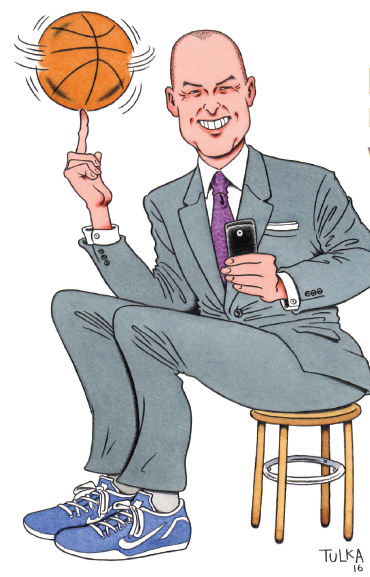Odds and Ends: Having a Ball

ESPN broadcaster Jay Bilas is one of the best analysts in college basketball—and one of the most vocal critics of the NCAA. A starter for Duke University from 1982–86, Bilas helped lead the Blue Devils to the men's NCAA championship game his senior year. After graduation, he played professional basketball in Europe, then returned to his alma mater in 1990 as an assistant coach while attending Duke's law school. His experience informs his criticism of the NCAA's amateurism model. "It's wrong to the point of being immoral that everyone is paid what they're worth in the multibillion-dollar business of college sports except the revenue drivers—the athletes themselves," he says. While his opinionated nature may not endear him to NCAA leaders—"I would be so much better off if all I did was talk about basketball," Bilas jokes—it has won him legions of fans and more than a million Twitter followers.
What do you expect in this year's NCAA men's basketball tournament?
Last year it felt like we knew the universe of teams that could win—Kentucky, Wisconsin, Duke. This year, I don't think any of us have a clue who's going to win. I don't see anybody that I would classify as great right now, but that's … wonderful!
That's entertaining to watch but not so fun if you're playing a March Madness bracket.
It means your dog or that person in your office who never watches basketball has as good a chance of calling the winner as I do. The fact that none of us knows this year has some real charm to it.
What do you think the NCAA's student-athlete model will look like in 10 years?
Amateurism has always been a sham. There's the fantasy of what college sports should be, which is the rhetoric of the NCAA, and then there's the reality of what college sports is. I don't see any problem with athletes getting paid for what they do. If we really believed that education and money were mutually exclusive, no other student would be allowed to make money. We don't tell people that they can't play their music for money and still go to school. Colleges should be allowed to compete for talent, and the players should be allowed to realize the financial benefits. It doesn't mean they won't be expected to be students. If colleges are allowed to pay, they're going to start signing players to contracts, like the rest of the world does now.
What basketball game would you like to go back in time to call?
I would choose the 1966 NCAA championship game between Texas Western [now the University of Texas at El Paso] and Kentucky. You had the first all African-American starting five playing against a team from an all-white league. At the time, people might not have fully understood what was going on, but the historical significance of that game grew so much that you wish you could have been there.
You're an avid tweeter. What do you like about Twitter?
At first I hated the idea of it. Before I started, I thought it was just one big bathroom wall. I love that it allows me to put a thought out there and engage with people one-on-one, which I do all the time. I've gone back and forth for hours with people who tweet at me. But I have a daughter and son in college who tell me I'm so far behind because I don't use Instagram or Snapchat. They say, "Dad, don't you get it? By the time you're on it, we don't want to be on it anymore."
—Interview by Theresa Walker